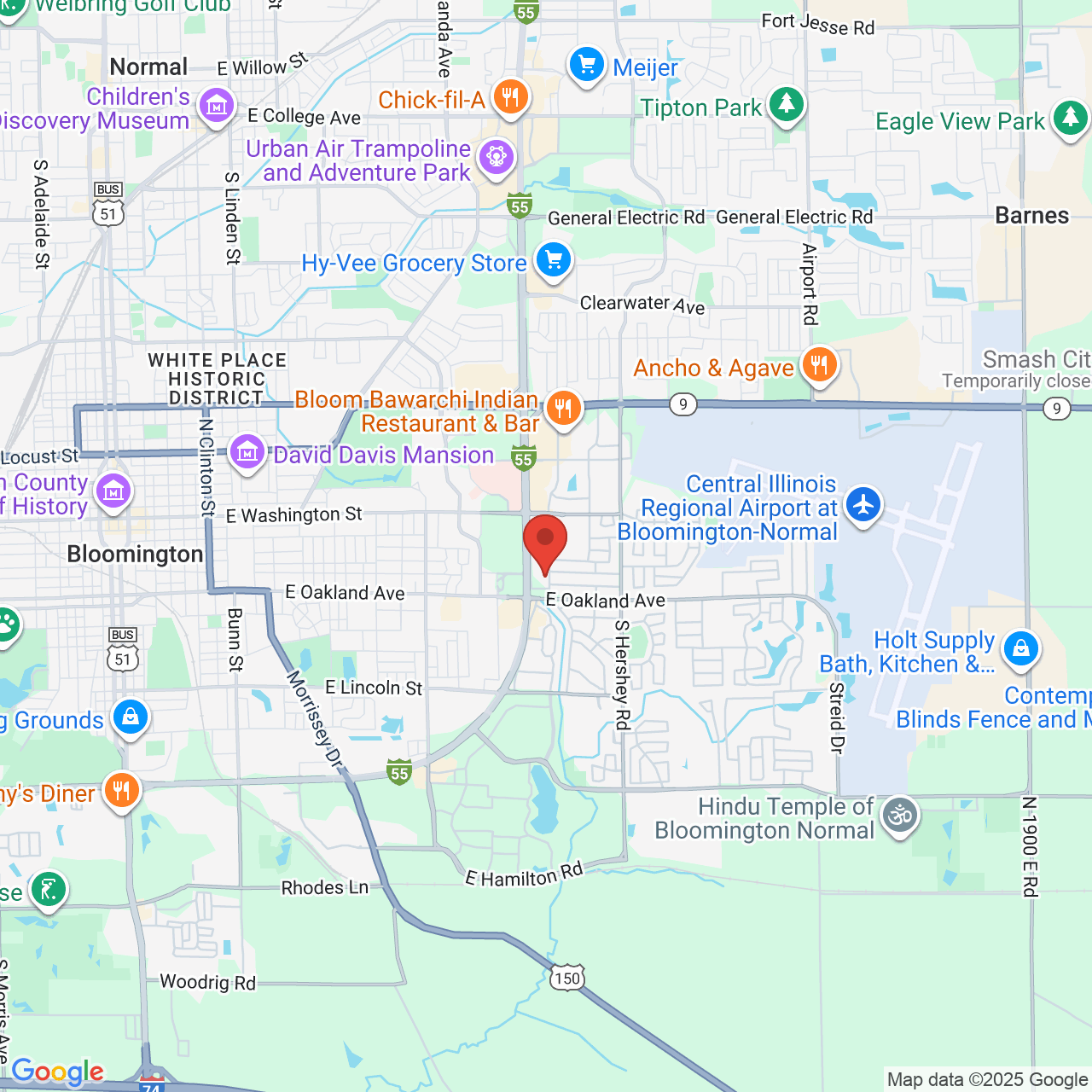Dental Implants
Are you searching for a reliable and natural-looking solution to missing teeth?
Dental implants are the only solution that not only restores your bite, but also prevents the bone loss that occurs when a tooth is lost.
Let Wyse Family & Cosmetic Dentistry in Bloomington, IL, transform your smile with natural-looking implant-supported restorations.
What Are Dental Implants?
A dental implant is a small titanium device that is placed in the jaw, where it fuses with the bone and acts like a tooth root. To completely replace a tooth, a connector piece called an abutment and an artificial tooth are attached to the implant.
While there are other dental procedures to replace missing teeth, they lack the essential component that stimulates bone growth and retention in the jaw: the tooth root. Without stimulation from the root, the jawbone begins to deteriorate. That is why patients with traditional dentures frequently need to have their dentures adjusted.
At Wyse Family & Cosmetic Dentistry, replacing a single tooth using this solution starts at $2,650.
Transform Your Smile How Dental Implants Are Placed
Implants Are Versatile

Dental Crowns
Teeth have an important role in supporting each other. If just one tooth is missing, it allows other teeth to slip out of alignment. A single implant topped with a crown keeps teeth in alignment and encourages regenerative bone growth.

Dental Bridges
If you are missing several teeth in a row, two dental implants can support a dental bridge and fill the gap. Because implant-supported bridges are self-supporting, nearby natural teeth will not need to be altered to act as supports.

Dentures
Dental implants securely support an entire denture, keeping it from slipping when you chew or speak. Implant-supported dentures also offer a stronger bite. And while traditional dentures accelerate bone loss, implants encourage bone growth and retention.
Implant-Supported Dentures: A Closer Look
Dental implants are especially beneficial to denture wearers. If you have worn traditional dentures, you know that they restore only a fraction of your biting and chewing power, can easily slip out of place, and need frequent adjustments. But dental implants keep dentures firmly in place, restoring virtually the same level of function that natural teeth provide.
We can use custom dentures to restore both traditional implants as well as All-on-4® implants, a solution that relies on just four specially designed implants (as opposed to six to eight traditional implants).

During your consultation at our Bloomington dental office, we can take precise measurements and provide you with an implant-supported denture that makes you look great and feel absolutely confident in your smile.
Is It Time to Repair Your Smile? Call for a Consultation
Missing teeth turn daily pleasures like smiling and eating into a burden. If you're looking for a reliable and natural-looking solution, take a moment to consider dental implants, the most complete tooth restoration solution available.
You can take the first step now by requesting a consultation at Wyse Family & Cosmetic Dentistry. Our dentists will examine your mouth and determine if implants are appropriate for your needs.
If you are ready to start the discussion, request a dental implant consultation. You can leave a message online or:

Serving Bloomington, Champaign, and Neighboring Communities
"Knowledgeable, courteous and fun."
David & his dental team are knowledgeable, courteous and fun. The office area is fresh & clean. They treat their clients like family and I would recommend their services to everyone.
View on GoogleNormally don’t like dentists..over 20 years ago I came here for the first time…haven’t gone anywhere else since.
View on GoogleMore Rave Reviews For Our Bloomington Practice
Everything went smooth. Friendly people. Good outcome
View on GoogleGreat dental care and great people. Highly recommend!
View on GoogleCosts, Insurance, and Financing For Implant-Supported Restorations
At our dental office in Bloomington, IL, serving Champaign and nearby communities, replacing a single tooth with an implant and custom restoration usually costs around $2,650. Of course, the final costs for your restorations can vary widely depending on how many teeth you need to replace, the type of restoration needed, and the materials used to make your restorations.
Your dental insurance plan will likely help to cover the cost of your restorations, but basic insurance does not contribute to the cost of implants. A member of our team will work to help you get the most from your coverage. We also accept financing through CareCredit®, which allows you to split your out-of-pocket costs into affordable monthly payments.
Do I Qualify for Implants?
Modern dentistry makes it possible for most people to qualify for dental implants. In general, you need to be in good overall health, not have any oral health issues such as gum disease, and be a non-smoker (or at least willing to quit).
In addition, you must have sufficient bone to support implants. However, if you find bone density is a problem, Drs. David Wyse and Jay Chrisman at Wyse Family & Cosmetic Dentistry can replace lost bone tissue in your jaw and help you qualify for implants.
Bone Grafts
Our dentists can restore bone density through a relatively simple treatment that involves inserting donor bone tissue or grafting material where there is low bone density. This triggers new bone growth over the next few months and results in a viable foundation for dental implants.


Sinus Lift
In some cases, low bone density occurs in the upper jawbone near the sinuses. In order to safely accommodate a dental implant without disturbing the sinus membranes, our dentists can perform a procedure called a sinus lift. The dentist will lift the sinus floor to a higher position and add donor bone tissue or grafting material to make room for the implant
"Everyone here is kind and professional." Glowing Reviews From Real Patients
Everyone here is very kind and professional. You definitely feel that you are a priority and your needs are their top concern. I have recommended them numerous times and will continue. It seems if you talk to anyone that comes to Wyse, you'll here the same good things over and over again.
View on GoogleMy hygienist Colleen and Dr Wyse are always very kind. Colleen is gentle yet thorough and effective. I’m very pleased I made the switch a couple years ago now and feel well taken care of.
View on GoogleWe Customize Restorations to Meet Your Needs With a Variety of Materials
Our team in Bloomington, IL, understands that each patient who visits us has their own needs and goals for treatment. In order to provide the most personalized service possible, we create dental restorations from a range of materials, each with its own benefits.
Your implant-supported restorations can be made from quality materials like porcelain, zirconia, and IPS e.max®. Each material can be made to look virtually indistinguishable from natural teeth, and we will take care to make sure your results look as realistic as possible, regardless of the material you choose.
IPS e.max, a special type of dental ceramic, offers excellent durability and an exceptionally realistic result. Zirconia is the very strongest material used in dentistry. During your consultation, we can discuss the advantages of each material and their prices in order to help you make an informed decision.
If you live in Champaign, Peoria, or nearby, we'd love to meet you. Request your appointment to begin discussing your treatment options today. You can reach us online or call:
Treatment Timeline for Dental Implants What to Expect
Questions about the process?
Healing After Implant Placement
Apply Ice
Wrap cold packs or bags of ice in a thin towel and place them on your cheeks for about 30 minutes at a time to reduce swelling. This can also help with pain.
Take Medication
Take pain medication as directed. Your oral surgeon may prescribe you a medication, but over-the-counter pain medications may be all you need.
Eat a Soft Diet
Eat a soft diet of items like smoothies, yogurt, and scrambled eggs for at least the first week. This will minimize irritation to the implant site and allow the incision to heal.
Frequently Asked Questions About Dental Implants
Q. Does dental implant placement hurt?
A. No. Your oral surgeon will thoroughly numb the area before your procedure begins to ensure you do not feel any pain. Some surgeons also offer sedation for those who need an extra level of comfort.
Q. What do I do if my restoration is uncomfortable?
A. While it does take some time to get used to your new restoration, it should not hurt or cause other issues. If you experience discomfort, rubbing, bleeding, or any concerning symptoms, please contact our Bloomington dental practice. Our dentists can make any necessary adjustments to the restoration to ensure a comfortable fit and proper function.
Q. How long do dental implants last?
A. Implants are made of durable titanium and are designed to last a lifetime. It is important to remember that your denture, dental crown, or bridge will wear over time and will eventually need to be replaced. However, with proper care and maintenance, your restoration can last for up to 15 years or more.
Q. Will people know I have implants?
A. The implant posts themselves are completely concealed within your jawbone. Our custom restorations are designed to look, feel, and function just like natural teeth. People will not be able to tell you have implants or a restoration. For those with dentures, there is also no risk of embarrassing slippage when you eat or speak.
Have more questions about dental implants and restorations?
"I would absolutely recommend them." More 5-Star Reviews of Our Bloomington, IL, Practice
I had 6 different appointments and they did an excellent job. I would absolutely recommend them. Nice work!
View on GoogleAlways responsive, high professional standards. Great experience!
View on Google


